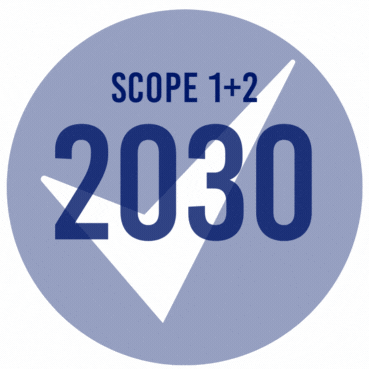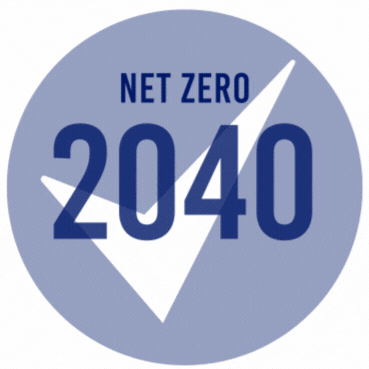
From food and fashion to energy and construction, Systemiq teams have been helping global industries to reduce their environmental impact. As we try to raise the pace of positive change, we’re doing the same internally too, with significant cuts in our emissions by 2025, as Aditi Ramdorai explains.
Systemiq has committed to setting near- and long-term emission reductions, company-wide, in line with SBTi, the Science Based Targets initiative. The plan, led by our internal Project Zero team, builds on our existing work to reduce our footprint.
We’ve been carefully managing our environmental impact since the very early days, ahead of gaining BCorp certification in 2017. But this is the first time we have charted a measurable path to 2040.
Our partner Altruistiq has assessed our emissions baseline. In 2022, Systemiq’s seven offices across six countries were responsible for 1,860 tonnes of CO2 equivalent – or 4.5 tonnes of CO2e per employee on average.
Direct Scope 1 and 2 emissions accounted for 4.4% – mainly consisting of energy use in our offices. Like many companies in our sector, the vast majority of emissions occurred in Scope 3: along our (upstream) value chain. Business travel accounted for around 42%, with direct and indirect purchases – from IT equipment and capital goods to insurance – accounting for 50%.
We have submitted our science-based targets in accordance with the requirements for small and medium-sized enterprises; but we are setting ourselves the standards for large companies, which is why we have set a net-zero target for Scope 1 and 2 in 2030, and Scope 3 in 2040.
Bigger reductions by 2030

We will be at net zero for Scope 1 and 2 by 2030, and will achieve 90% of this target through absolute reductions.
We aim to achieve 80-100% renewable energy in our offices by 2025. Where this is impossible due to local circumstances, we will purchase renewable energy certificates.
Since a significant share of our scope 3 emissions (approx. 40%) comes from business travel, we have set a target to reduce travel emissions by 50% per employee by 2030.
Going further

To be aligned with the Paris Agreement and a 1.5°C future, we will reach net zero for all emissions by 2040.
In the same target year, we aim to reduce Scope 3 per-employee emissions by 97%.
Until then, we will finance beyond-value-chain mitigation of our Scope 1, 2 and 3 emissions through our partner Vertree to neutralise any unabated emissions.
doing it the systemiq way
Our Project Zero work draws on our in-house capabilities, partnerships and system-level experience.
- We are partnering with Altruistiq to annually update and report on our emissions.
- We already compensate all our emissions with our partner Vertree and will continue to do so with any unabated emissions until we reach net zero.
- Everyone at Systemiq works rigorously to decarbonise systems and move towards a sustainable future.
Policies in practice
At Systemiq, we’re changing how we travel:
-
- To reduce travel emissions, Systemiq now has a policy whereby trains must be taken, where possible, when the journey is under 6 hours.
- Virtual meetings should be preferred when the duration is less than half a day.
- Our travel agency will preferentially choose hotels which comply with high sustainability standards.
…what and how we procure and purchase:
-
- All offices will be expected to offer only vegetarian and vegan catering (except if no alternatives exist in Indonesia or Brazil, or when entertaining clients).
- We will procure second-hand appliances whenever possible.
- At least 50% of our suppliers will have set net-zero targets by 2025, including our banking and insurance providers.
- Systemiq will implement due diligence questionnaires for vendors above a purchase threshold of EUR 25,000.
…and where our energy comes from:
-
- By 2025, we aim for our offices to be running on 100% renewable energy.
- Where this is not possible in a particular location, Systemiq will purchase the equivalent renewable energy certificates.
Many of these policies reflect best practices that we are already following.
Office initiatives
Some highlights from our office initiatives include
- Indonesia: Our employees now use a car-pooling system to visit project sites instead of travelling individually by renting scooters.
- Munich: The Munich offices purchases the majority of their food (milk, snacks, fruit) from regional sources and almost packaging free or in reusable packaging. All food complementary at the office or events is vegetarian.
- London/Amsterdam/Paris: All complementary food at the office or events is vegetarian.
- Brazil: The new office location was chosen with sustainability criteria in mind – for example, all furniture is from locally sourced, eco-friendly materials.

With the Net-Zero initiative, we have already achieved many good changes: with the help of a worm-box, we can compost part of the organic office waste – the rest of the waste we separate as much as possible and take glass away ourselves. The office snacks are already 60% organic. Since July, we have been trying to buy milk completely from reusable glass bottles. Other office supplies are from certified retailers, 100% recyclable and mostly packaging-free.
Viola Rose, Munich

